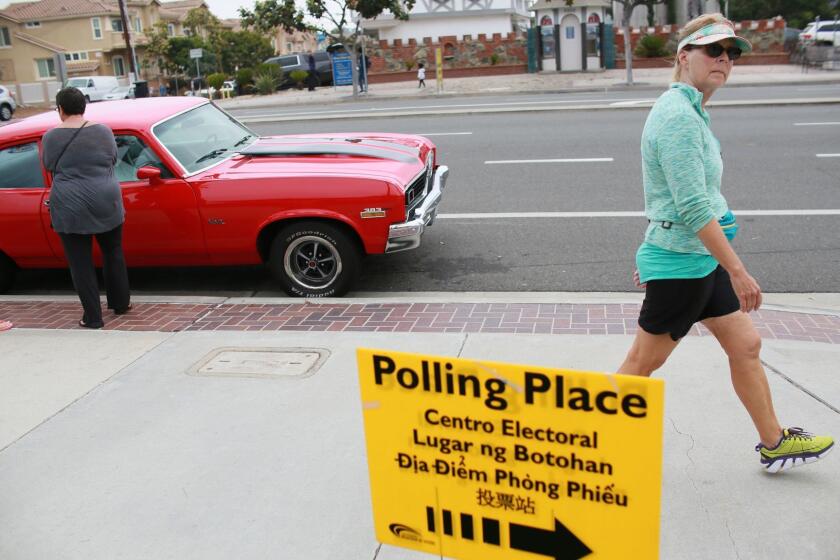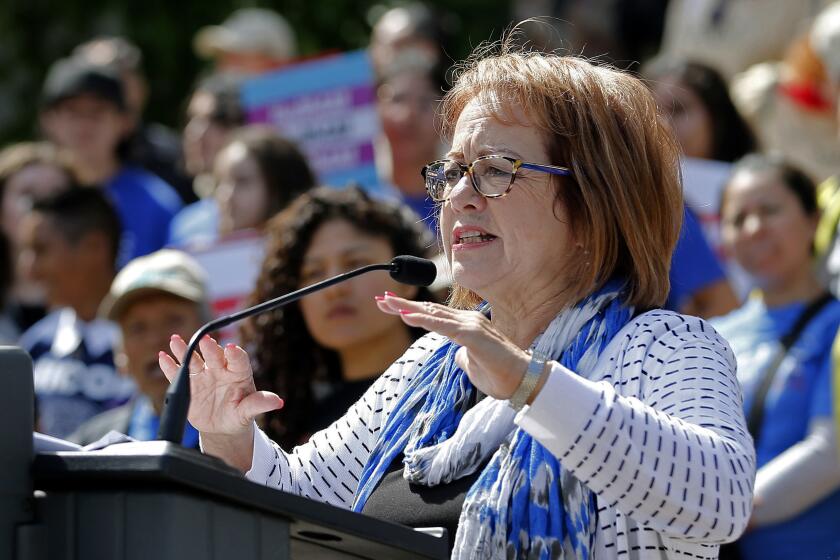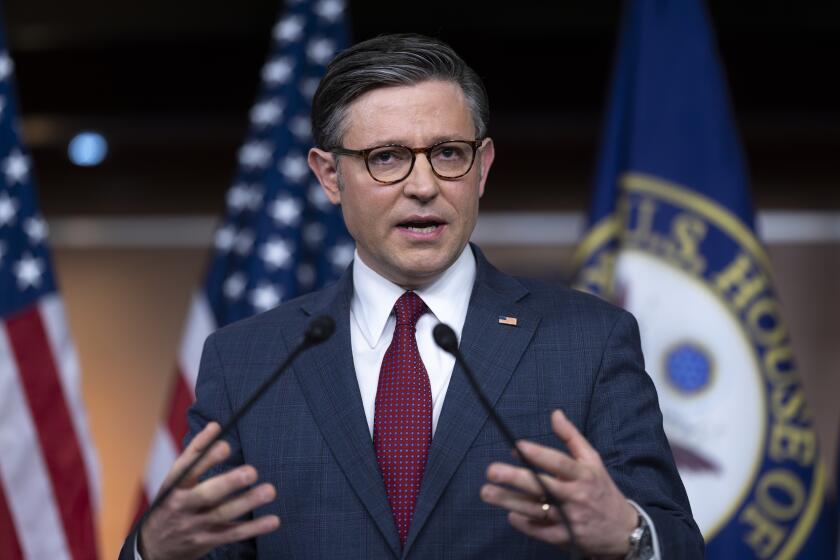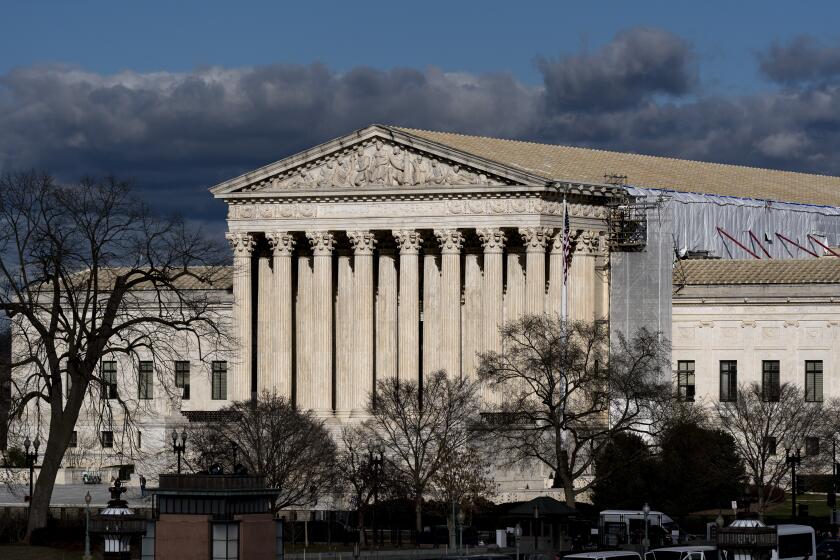Group says Rep. Duncan Hunter is too close to the vaping industry, seeks ethics review
A legal advocacy group has asked the Office of Congressional Ethics to look into Rep. Duncan Hunter’s “endorsement of private vaping products in blatant disregard of the House Ethics Rules” — but Hunter’s office says the group is just blowing smoke.
A letter this week from the American Democracy Legal Fund claims Hunter, R-Alpine, is too close to the vaping and electronic cigarette industries. The group often targets Republicans but has also filed complaints against liberals such as Vermont Sen. Bernie Sanders.
In an email, Hunter spokesman Michael Harrison said the attack is baseless. The congressman did nothing improper and he often supports a wide spectrum of issues that he believes will benefit his constituents, Harrison said.
“Congressman Hunter appreciates and supports the fact that the vaping industry is focused on harm reduction, meaning that vaping is an important tool utilized by many people to help reduce the harmful habit of smoking,” Harrison said.
The advocacy group said in a statement that Hunter has crossed an ethical line.
“The rules are there to ensure that Members of Congress don’t use their positions of power to favor specific companies, brands or industries or to benefit themselves or their personal interests. Congressman Hunter has violated the letter and spirit of rules against such activity and the Office of Congressional Ethics must investigate his blatant flouting of these rules immediately,” the legal fund’s president, Brad Woodhouse, said by email.
The legal fund’s complaint alleges Hunter has fouled House ethics rules by becoming “too closely affiliated with the vaping industry, creating the appearance that he is accruing benefits and dispensing special favors for the industry” and endorsing specific vaping products.
The legal fund was founded in 2014 by David Brock, the head of several political committees that have backed Democratic campaigns. Brock also founded Citizens for Responsibility and Ethics in Washington, an organization that filed an earlier complaint about Hunter’s use of campaign contributions for personal expenses. Hunter said he made honest mistakes with his campaign funds, has repaid misspent money and denies all wrongdoing. The FBI is investigating.
The legal fund’s letter said Hunter has become overly close to the vaping industry to the point where the congressman has:
- Asked President Donald Trump to repeal or delay the implementation of Food and Drug Administration vaping regulations.
- Asked the Navy to reevaluate the service’s ban on vaping on ships, a prohibition the service implemented out of concerns of overheating electronic cigarette batteries.
- Spoken at a vaping conference in Texas and appeared in an online video with a vaping advocate where he promoted vaping.
- Endorsed specific brands of vaping products while on the Hill. At one point, in a post on an online forum, he said he had passed out a vaping company’s business cards, which he received along with their products, and had convinced “staffers” and security guards to buy their wares. He called the product in question a “huge, manly, vaping machine.”
While not mentioned in the legal fund’s complaint, Hunter was also featured in an advertisement promoting the Vape Showcase trade show in Texas. Hunter’s official position in Congress was mentioned and a picture of Hunter wearing his House pin was included.
Hunter was invited to the conference by constituents and the vaping industry provided no money to compensate the congressman for his time or for his travel-related expenses, Harrison said. He also received a green light from the House Committee on Standards and Official Conduct before he agreed to go, Harrison said.
“Before accepting and confirming any appearance, our office always checks with the official House Committee on Standards of Official Conduct, often referred to as the House Ethics Committee, for full review, feedback and approval. We did so in this case, and Congressman Hunter was informed that he could attend the conference in his official capacities,” Harrison wrote.
The House Ethics Manual states, “A member may be asked to participate personally in an event that is sponsored by an outside organization, such as privately-sponsored Medicare prescription card events. In participating in such an event, members and staff must avoid becoming too closely affiliated with any commercial entity, in order to avoid any appearance that they are accruing benefits by virtue of improper influence exerted from their position in Congress, or are dispensing special favors. Thus, in participating in a privately-sponsored event a member must take care to avoid any action that may be perceived as an endorsement of the private sponsor.”
Records show that the congressman has received $7,200 from American E-Liquid Manufacturing Standards Association board members and the group’s lobbyist, Larry Flick, in 2016 and 2017, according to a U-T Watchdog review of financial reports.
People connected to the electronic cigarette and vape industry also have given Hunter’s campaign at least $39,461 since 2015, records show. Lobbyists representing the vaping and tobacco industries, among other clients, gave Hunter at least another $19,750.
Hunter’s campaign reported receiving at least four contributions totaling $3,750 on Feb. 10, 2016, one day before a Transportation and Infrastructure Committee meeting where he made a case against an amendment to ban vaping on airplanes. During this hearing Hunter famously blew a puff of vapor from his electronic cigarette in an effort to make a point that the plume is harmless.
Brendan Fischer of the non-partisan Washington, D.C.-based Campaign Legal Center, said Thursday by telephone that Hunter’s vape-related activity raised some questions about how he is using his time, but it didn’t necessarily cross ethical lines.
“All of this indicates Hunter’s close relationship with the vaping industry, which I don’t think is a secret,” Fischer said. “It’s not something he has tried to hide. The question is whether it implies an official endorsement. This doesn’t seem to rise to that level.”
Fischer said it’s not necessarily outside of ethical guidelines for a congressman to tell people he knows about a product he likes. It could become a problem if it appears to be an official endorsement or if he or his family have a financial interest in the product or company.
In 2015, the Ethics Committee considered and unanimously voted to dismiss a complaint about improper endorsements and use of official resources by Rep. Jared Polis, D-Colorado. The complaint alleged that Polis had improperly endorsed a video game business and a men’s clothing company in his district.
Polis said he never told anyone to buy any of the businesses’ products he was accused of endorsing and he did not intend for his participation in either event to be used for commercial purposes. Polis told the committee he considered his participation in both companies’ events to be part of his representational duties, the report said.
The committee concluded that Polis had not crossed any legal or ethical lines.
The report went on to remind members of Congress be cautious to avoid the appearance of improper official endorsement or use of official resources in their interaction with private businesses and to seek committee guidance if they have questions before agreeing to engage in activities with private entities.
Twitter: @jptstewart
joshua.stewart@sduniontribune.com
(619) 293-1841
Get Essential San Diego, weekday mornings
Get top headlines from the Union-Tribune in your inbox weekday mornings, including top news, local, sports, business, entertainment and opinion.
You may occasionally receive promotional content from the San Diego Union-Tribune.









